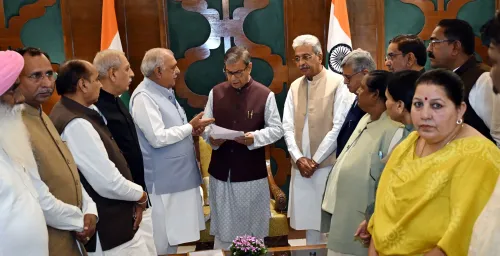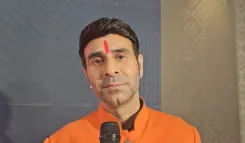Is Online Radicalisation Without Recruitment a New Threat? Umar Nabi’s Case Highlights Security Challenges

Synopsis
Key Takeaways
- Online radicalisation is a growing threat, complicating security efforts.
- Individuals can self-recruit into terror groups without external influence.
- Lone actors pose significant challenges for tracking and prevention.
- Authorities must develop evolving strategies to counteract these threats.
- Case studies like Umar Nabi's are essential for understanding this trend.
New Delhi, Nov 13 (NationPress) India is experiencing a significant transformation in its approach to tackling terrorism. The rise of online radicalisation and individuals willingly joining terror organisations without external influence poses a serious threat.
Dr. Umar Nabi exemplifies this troubling trend. He was responsible for the blast near the Red Fort, having joined the Jaish-e-Mohammed without any external persuasion. Investigators reveal that Nabi had been active in several online channels associated with the terror group since 2018.
According to Intelligence Bureau officials, from 2018 to 2023, he refrained from engaging in communication with these groups. Instead, he passively consumed content, never commenting or discussing it with anyone, maintaining a low profile.
However, in 2023, he independently resolved to join the Jaish-e-Mohammed and planned to execute terror acts. He formed a small circle to strategize his plans. Over the following months, Nabi established 15 Telegram channels and invited select individuals.
He initiated discussions centered around the ideology of Masood Azhar, the leader of the Jaish-e-Mohammed, emphasizing the significance of supporting the group. His online prowess enabled him to evade detection by security agencies.
Nabi utilized virtual numbers obtained through VPN and VoIP applications registered in Nepal and Turkey. Once his network was established, he brought in senior members from the Jaish-e-Mohammed in Afghanistan for further discussions. He also received input from members in Turkey. Prior to forming the Faridabad module, each group member had two handlers—one from Afghanistan and another from Turkey.
Investigators observe that his mindset and tactics shifted drastically in 2023. He became increasingly resolute, believing that mere indoctrination was insufficient and that executing significant attacks within the country was imperative.
An official stated that Umar Nabi operated similarly to a lone wolf. He engaged with online radical channels independently, recruiting himself without outreach from others. This emerging trend is alarming, as it complicates tracking such individuals. They operate in solitude, appearing ordinary to the outside world.
The lack of suspicion surrounding their daily activities is advantageous for terror groups but poses a substantial challenge for security agencies. The fact that Nabi managed to operate stealthily from 2018 to 2025 underscores the peril these operatives pose to national security.
Many individuals across the nation could potentially be lone-acting terrorists, motivated by digital influences rather than structured networks. These self-starters have no obligations to the terror groups they support and are willing to act autonomously. Officials assert that such individuals represent significant assets for terror organisations.
This presents a formidable challenge for security agencies moving forward. Authorities believe that cases like Nabi's should be studied to grasp the severity of the situation and develop effective counter-strategies. There is a pressing need for evolving tactics to address these threats.









